|
|
|
|
|
|
 |
|
|
 |
 |
 |
| |
The club won the league 4 times in the 90s 90, 91
,93 and 95 and the Moi golden cup only once (95). In fact Gor Mahia
would have won the league in 1992 as well. They were tied with arch
rivals AFC Leopards on the final day and the winner was bound to be
determined by goal difference. AFC beat Transcom 7-0 on the final day.
If this result were investigated, it is likely that it would have
emerged that Transcom were bribed to concede several goals. On the
continental scene the club reached the quarter finals of the champions
cup in 1992 and the quarter finals of the CAF cup in 1993.
The 1990s was the beginning of a downward spiral for the
club. The years between 1990 to 95 saw Gor Mahia continue to dominate
the local scene. However it was obvious to all that the previously lofty
standards of the club were in decline. It became extremely difficult to
sustain the self-supporting club as a society. |
|
In addition the economy in Kenya has taken a tumble leading to financial
difficulties for several Kenyan clubs. Whereas in the past, the club was able to
secure employment for players at Parastatals such as KPTC, economic reforms in
the country made this impossible. This made it more difficult for community
teams to attract the best players.
The club was now unable to retain most of the good players who leave
soon after their arrival in search of greener pastures or due to
frustrations caused by lack of payment of allowances. Several
outstanding players came and went within a year unlike in the past when
players stayed on for several years thus building familiarity
|
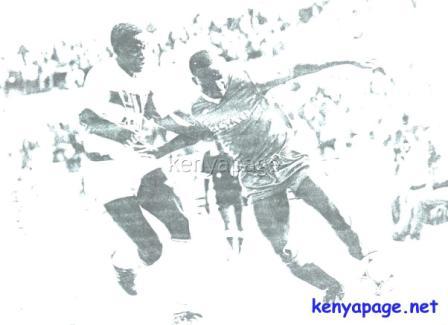 |
Felix Otieno seen here in action against sibling Bernard Otieno "Zico" circa 1991. Felix was extremely talented but indiscipline stopped him from reaching his potential. Also worth noting, 1991 is the only time Kogalo had a shirt sponsorship (International Casino) thanks to Chairman Joe Ogode
|
| |
The early 1990s saw the departure or retirement of most of the players who featured in the crack squads of the 1980s. David Ochieng , Onyango Fundi , Odembo Nyangi , Ochieng Pierre and many others retired from active football. Austin Oduor and Abass Magongo left for the middle East while others like Sammy Onyango joined other clubs.
Coach Len Julians , returned briefly in 1991 and managed to steer the club to yet another League title. Among the players paraded by the club in the early 90s include goalkeeper Charles Omondi "Korea" , Jared Ochieng Achieng , Sammy Omollo, Allan Odhiambo, Paul Ochieng , Felix Otieno and Mike Otieno.
One of the clubs biggest highlights came in 1992 when they eliminated traditional giants Canon Sportif de Yaounde In the Africa Champions cup. After settling for a barren draw in Nairobi , most pundits had written them off. However they managed to force a 1-1 draw in Cameroun thanks to a stellar defensive effort by among others Otieno Zico , Paul Ochieng , Tobias Ocholla and Allan Odhiambo. This enabled the club to reach the quarter finals.
|
| |
1994 saw a re-match with Egypts Zamalek who exactly 10
years earlier had eliminated them under dubious circumstances.In the
first leg in Nairobi Gor Mahia played a superb game with Dan Ogada and
Tom Okaya pulling the strings in midfield while Dan Shikanda ran rings
around the Egyptians from the left flank. After drawing the first leg
1-1 Gor Mahia once again lost to a dubious penalty in Cairo.
In 1995 was a relatively successful year for the club as they won the
national league title as well as regaining the Moi Golden cup in grand
style. Players like Dan Ogada , Allan Odhiambo , Steve Odiaga and Tom
Okaya spearheaded this campaign.
|
|
|
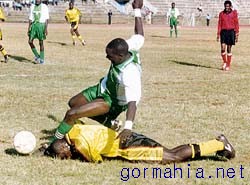 |
Dan Ogada evades a rugby tackle from an Eldoret FC player. Ogada was arguably Gor mahia's most consistent player of the 1990's
In 1998 Gor Mahia faced Zamalek in the 1st round of the CAF cup. The game was won by a thunderbolt of a shot from Steve Okumu. Gor Mahia's line up on that day was : 1.Victor 'Vicky' Onyango 2.Pius 'Apuoyo' Wamaya 3.Joseph 'Jose' Akinga 4.Allan 'Ale' Odhiambo 5. Josiah 'Kaki' Ougo 6.Tom 'Gazza' Juma7. Patrick 'Adesh' Oyiengo 8.Dan 'Dunga' Ogada 9.Steve 'Brigadier' Odiaga 10.Frazier Ochieng
|
| |
1996 was the most disastrous year in the club's history. They were eliminated in the 1st round of the Africa champions league by Zimbabwean outfit, Dynamos, leading to the worst riots ever seen in Nairobi. In the League they finished 8th which was unprecedented in the clubs history. In 1997 , the club recovered and almost won the National League , only losing by goal difference to eventual winners, Utalii. Among the players who were instrumental in that campaign were Victor Onyango in goal, Josiah Ougo and Tillen Oguta in defence, Frazier Ochieng and Dan Ogada in midfield and Bonaventure Maruti, Steve Okumu and Steve Odiaga in attack. The club was unable to hold on to these superb players , many of whom left for various destinations including the Middle East. The last two years of the millenium were characterised by inconsistent performances by the club mainly due to lack of finances. Because the club is flat broke they have been unable to hire a qualified professional coach, Additionally the club has been unable to retain its quality players most of whom leave after a short period for greener pastures.
|
| |
In 2001, Raj Binder Singh became the first Kenyan of Asian origin to become chairman of a major football team when he became chairman of Gor Mahia. He became the third club chairman in two years. His main brief was to secure sponsorship for the club. The sponsorship never came to fruition. Not sure why anyone thought that he would be able to secure sponsorship
|
| |
The year 2002 will go down in history as the worst in the history of the club. They finished with a record of 3 wins, 4 draws , 12 losses and a goal difference of minus 20 goals. Only Re-Union had a worse record. For the first time in the club's history, Gor Mahia was relegated from the top flight. The club had finally sunk to depths which would have been unthinkable only 5 years earlier. The league had been divided into two groups. Gor Mahia finished at the bottom of group B behind other relegated teams like Pan Paper and Mombasa Heroes. They however received a reprieve from the KFF. Even after the reprieve, the club officials could not get their act together and save the club from furher ignominy.
|
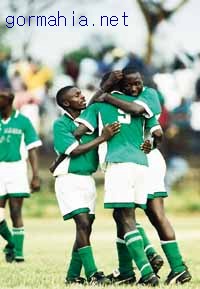 |
Jackson Mureu, Nick Otieno and Benard Odhiambo celebrate an equalizing goal during a league match. There was'nt however much to celebrate during the 2002 season and many will want to forget it quickly.
|
| |
In 2003 Gor Mahia was the runner-up in the 2003 KPL Transparency Cup cham-pionship and received from KPL a cash award of Ksh 500,000, the largest amount ever received in the 35-year history of their club. Gor Mahia player Kenneth Omondi received from KPL a cash award of Ksh 10,000 as their "Best Player". Gor Mahia player Jackson Atika also received from KPL a cash award of Ksh 10,000 for "Best Fairplay".
|
| |
In 2004 at the end of the 2003-04 season, Gor Mahia had won only two games and finished in last place but avoided relegation when the KFF and Premier League clubs agreed to reconcile and form a "unified league" with 24 clubs playing in two groups with the last three clubs in each group to be relegated at the end of the 2004-05 season.
|
| |
In 2005 at the end of the 2004-05 season, Gor Mahia had won only six matches and ended among the three last clubs to be relegated in Group A. But on June 10th Gor Mahia Chairman Erastus Okul convened and chaired a meeting of the “KFF Premier League Committee” which re-jected a Kangemi United player’s card which he had himself signed on behalf of KFF as an acting KFF official earlier that year, declared the player ineligible and then deducted three points from Kangemi United. Kangemi then dropped just below Gor Mahia in the standings and was to be relegated instead of Gor Mahia. But a higher appeals body rejected and reversed that decision. Kangemi got their three points back and Gor Mahia was again relegated.
In August 2005 Nzoia FC dropped out of the league. The KPL clubs met and decided to change their previous decision not to replace clubs which dropped out. Instead the KPL clubs agreed to allow the two highest placed clubs which had been relegated in each group, Securicor and Gor Mahia, to play a special home/away playoff to determine which club would replace Nzoia for the 2005-06 season. But Mr. Okul refused to allow Gor Mahia to honour both playoff matches. As their club did report for both matches, Securicor rejoined the league and Gor Mahia remained relegated.
In September 2005 Pipeline FC dropped out of league. Despite the refusal of Gor Mahia to re-spect the rules and also honour their playoff matches, the KPL clubs still allowed Gor Mahia to replace Pipeline in the 2005-06 KPL Premier League.
|
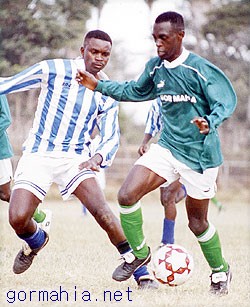 |
Forward Emmanuel Wakata scored several crucial goals for Kogalo in 2005
|
| |
Gor Mahia spent much of 2006 engaging in fights with KPL.
Chairman Erastus Okul adopted an antagonistic and confrontational
attitude towards KPL. To make matters worse, some KPL officials were
indeed trying to kill the club in the mistaken belief that the demise of
Gor Mahia and AFC Leopards would herald a new dawn for Kenya football.
At one point, the club refused to pay a KPL imposed fine. KPL Managing
Director received full payment of the Gor Mahia penalty from an
anonymous "senior official of another KPL club" who wrote in an unsigned
letter that "it is deeply disappointing that a few colleagues who are
senior Gor Mahia officials refuse to respect the KPL policy against
assaults on referees which their representative approved in February.
Their refusal to respect the rules also saddens me because it is not
those officials but their own players who are suffering the most after
playing so well this year. Out of respect and sympathy for the Gor Mahia
players, I enclose full payment of Ksh 45,063 so they can resume playing
…"
KPL Thus allowed the club to resume playing. But the belligerent Okul
refused to allow the club to play and proceeded to skip 3 succesive
matches. KPL thus relegated the club again. It came at a time when Gor
Mahia were doing well in the league and likely would have finished
amongst the top 3. Striker Ken Oliech was amongst the top 3 scorers in
the league. The primary losers in Okul's ego tripping were ofcourse the
fans and the players whose valiant efforts were wasted by officials.
|
|
|
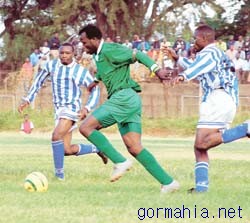 |
Ken Oliech in action against AFC Leopards circa 2006
|
| |
In 2007 KFF decided to set up their own league, KFF PL, in an effort to dismantle the KPL. Gor Mahia and relegated teams Shabana, Kangemi and AFC Leopards were added to make the league consist of 20 clubs. FIFA intervened to unify KFF-PL and KPL. Whereas KPL wanted Gor Mahia relegated, Jerome Champagne insisted that Gor Mahia remain in the league. The season ended with Gor Mahia finishing 11th out of 16th.
2008 heralded a new era for the club when Ambrose Rachier was elected Chairman. The years between 2001 and 2008 had been by far the worst for the club. The entry of a new set of officials was indeed seen as a breath of fresh air by fans who deperately wanted a forward thinking chairman with ideas for how to return the club to past glory. In 2008, Gor Mahia won the Presidents cup after beating Posta Rangers 2-0 in the final, thus earning the right to play continental football for the 1st time in about a decade.
|
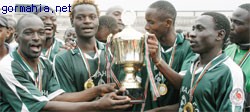 |
Kogalo pose with the Presidents cup
|
| |
So in 2009, Gor Mahia sought to star a fresh. Coach James Sianga went about recruiting young players to build a team for the future. In came players like Ibrahim Kitawi, George Odhiambo, Duncan Owiti, Chris Wekesa amongst others. Kogalo played APR of Rwanda in the 1st round of the CAF cup. The young players some ofwhom were still in secondary school were clearly overawed by the occasion. Their stage fright and inexperience showed as they lost by 5 clear goals. Gor Mahia however went on to play a stormer of a second leg in the KPL that saw them go from 10th position to 5th. George Odhiambo now dubbed "Blackberry" was voted young player of the year by a panel of journalists and along with Peter Opiyo, Julius Owino and Ibrahim Kitawi, was named to the national team.
|
| |
In 2010 Kogalo started the season with two coaches;
Gideon Ochieng 'Agido' was the headcoach and former full back Zedekiah
Otieno was designated as the Technical Advisor. That arrangement did not
last long as it reportedly caused divisions in the camp and most players
sided with 'Agido'. As the clubs top brass wanted Zico, Agido was
sidelined in mid season. Gor Mahia went on to play strongly in the
second leg of the league and came within a whisker of winning the
league. The league winner was determined on the last day of the league
and Gor Mahia finished second behind Ulinzi Stars. At the end of the
year, George Odhiambo 'Blackberry' , who had played 3 stellar seasons
for Gor Mahia and finished second in KPL scoring, secured a 4 year
contract with Danish top tier side, Randers FC. Odhiambo was also voted
KPL player of the year
|
| |
From a financial perspective, 2011 was a landmark year because that was the year that Gor Mahia secured a shirt sponsorship for the first time ever. Previously in 1991, Gor Mahia wore shirts emblazoned "International Casino". However the proceeds from that sponsorship are unknown and clouded in mystery. The Tuzo sponsorship was the most lucrative by any club in Kenya.

Edwin Lavatsa, Eric Masika, Anthony Akumu, Kevin Omondi and Chris Wekesa flash their new shirt sponsors
Also in 2011, Gor Mahia won the local cup, now called the FKF cup after
beating Sofapaka 1-0 in the final thanks to a goal by Edwin Lavatsa. Gor Mahia
thus qualified for the CAF Confederations cup.
The beginning of 2012 was a tumultous time for Gor Mahia. In a bid to
strengthen the team, the club went on a signing spree. Unfortunately, the
signing was being directed by members of the executive council and not by the
technical bench. A Nigerian by the name of Felix Nwosu, who called himself
"Felixinho" suddenly showed up at the club's training ground and expressed
interest in joining the team. He claimed to have played for Enugu Rangers. A
section of fans were excited. However soon coach Anaba Awono expressed
dissastisfaction with Nwosu saying he was an average player not worth signing.
Nwosu then sent a series of threatening SMS messages to Awono. A few days later
Nwosu was dismissed. Another signing that did not pan out was that of Anthony
Otieno Nyangor who had been signed after putting on a stellar display against
Gor Mahia during the club's tour of Kisumu county. He soon earned the nickname "Ballotieno".
Four other players were signed including George Midenyo, Hugo Nzoka, Ivo Mapunda
Yusuf Juma and Rama Salim.
Gor Mahia started the season disastrously, losing 4-0 aggregate in the
opening round of the CAF cup to Ferroviario of Mozambique. They also played
poorly in the league. By the time the league was six games old, Gor Mahia were
in the relegation zone. It turned out that much of the poor performance was due
to infighting within the bloated technical bench and the Executive committee. In
a bid to stem the tide of poor performance, the club sacked the entire technical
bench including Coach Anaba Awono, former captain Julius Owino, team manager
Ouma Ole Tunda and assistant coach Ken Odhiambo.
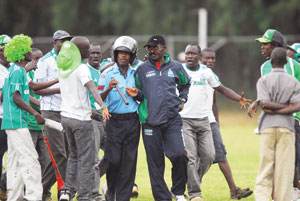 Fans
confronted coach Anaba Awono after another poorperformance this time against
Karuturi sports Fans
confronted coach Anaba Awono after another poorperformance this time against
Karuturi sports
Legendary stopper Bobby Ogolla took over as coach on a interim basis,
assisted by Tom Ogweno. Two weeks later, Croatian coach Zdvarko Logarusic was
appointed as coach.
Logarusic soon overhauled the team getting rid of almost a dozen players
including Demonde Selenga, Hugo Nzoka and later Dan Makori and Ibrahim Kitawi.
The arrival of Logarusic caused a change in fortunes for the team. Gor Mahia
went through a stretch of a dozen games where they did not loose. By September,
Gor Mahia were amongst the league leaders. By the last match of the year, Gor
Mahia were leading with only a game left. They needed to beat Thika United in
the last game to clinch the league. However they were held to 1-1 draw and ended
up finishing second to Tusker.
|
|
|
 |
 |
 |
|
|
|
 |
|
|
|
|
|
 |
|
|
|
|
|
 |
 © Copyright 1999-2009, Parallels. All Rights Reserved.
© Copyright 1999-2009, Parallels. All Rights Reserved.
|
 |
 |
|
|